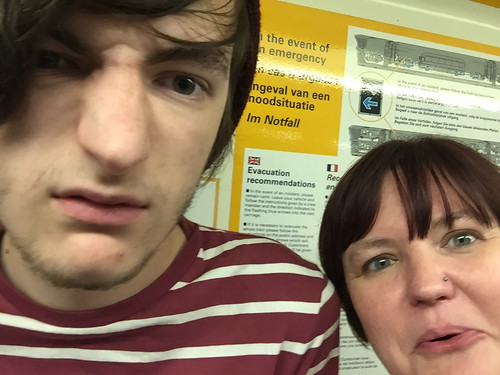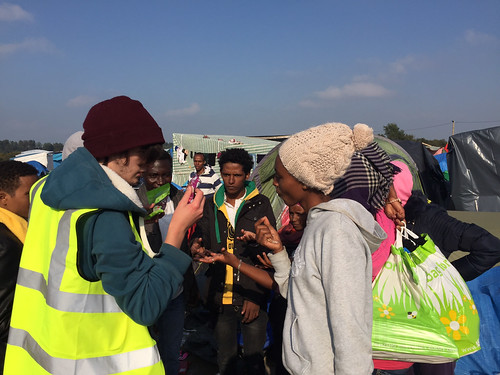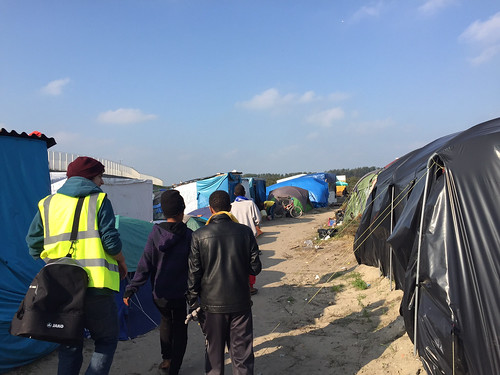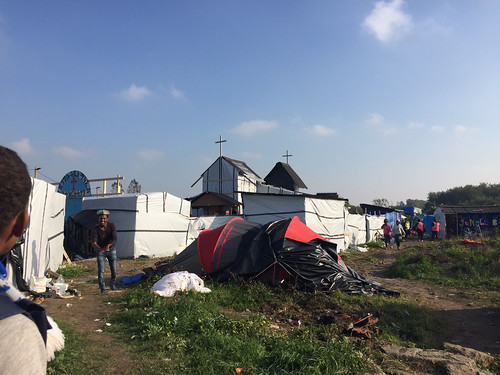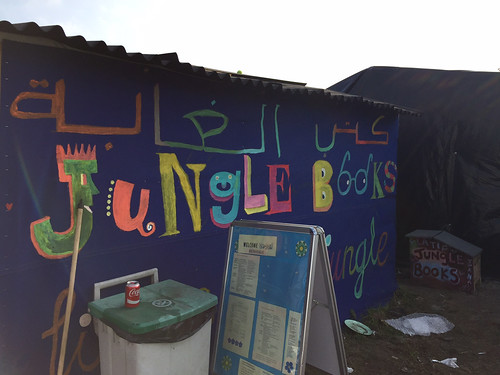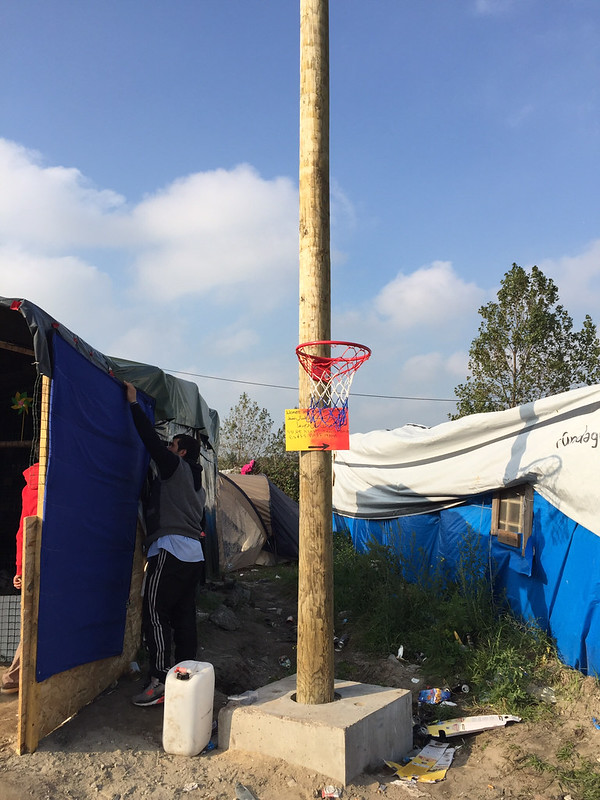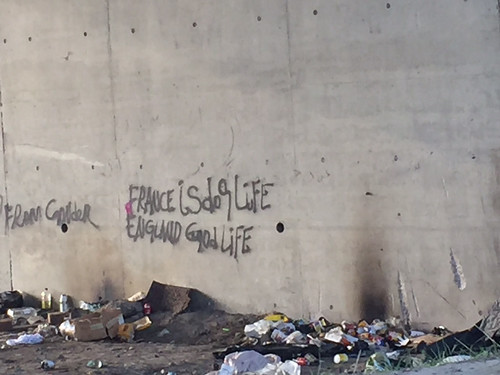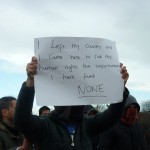Yesterday Dan and I went back to the refugee camp at Calais with the Swindon Calais Solidarity group. It was a day of really mixed emotions, and a day when we began to make friends with some of the people who live there.
The idea of this trip was to take “luxury items”: fresh and tinned fruit, tinned fish, scarves, hats, gloves, torches, cake and biscuits – that kind of thing – and explore the camp better, meeting people who are less able to get to the main thoroughfare where most of the mass distributions take place. We set off at the crack of dawn as a convoy of four cars but disaster stuck when the lead car had a puncture on the M4, leading to a lot of milling around on the hard shoulder, a wait at a service station near Slough and an excursion to Heston Services, where a new tyre was fitted. As well as the expense of the tyre itself, it lost us a lot of time and we arrived in Calais a good two hours later than planned.
Then followed some chaotic packing as each car had a variety of things in it and we all wanted to take a mix of items into the camp. The original idea had been to have large rucksacks and stick to one type of thing in the main body of the bag and then smaller things in the pockets, but all very orderly so we knew exactly what was where. However, we were having to make do with a range of rucksacks, holdalls and smaller bags and I ended up with a mixture of scarves, torches, food and other bits in my bag, plus three solar radios Steve had donated, which I was determined would go to the restaurants where they could be enjoyed by many people, rather than to individuals.
On arriving at the camp I immediately noticed how much busier it seemed than a fortnight ago; there were also many more buildings being constructed along the main paths, most destined to be restaurants or cafe bars serving basic food and hot drinks. When I say buildings, these are actually shacks constructed from bits of pallets and branches covered with thick plastic or tarpaulin. You have to admire the ingenuity of the people there, who are using the most basic materials to good effect.
We split into smaller groups and Dan and I headed off along one of the paths with some other people. I wanted to get into the heart of the camp but we made the mistake of stopping to talk to some guys and as you do, we asked them if they wanted some biscuits. Big mistake, because as soon as I opened the holdall we were mobbed! We tried to get people to form a queue but it was more of a scrum really, and as Dan and I had such mixed bags of stuff it was really difficult to find the things people wanted and there was a bit of pushing. One refugee, a very tall, quiet guy, came to our assistance and asked people to get into a queue and found me a place where I was safe (I was in danger of being pushed into a spiky bush!) and I did my best to hand things out but it was all a bit chaotic and a little bit scary – even though people were being very polite, thanking us for the things we had and with lots of smiles. The only time I was seriously scared was when I gave the holdall to Dan. Seemed there had been more respect shown to me than him, as people did start pushing and shoving a bit and it was very difficult to control the situation.
I'd taken wind up torches over – a wonderful gift bought with money donated by my daughter, and thanks to Maplin doing me a good deal I'd managed to get fifty torches, which had been shared between the groups of volunteers. They were really sought after and I wished I'd been able to take more. Next time, maybe…
One guy spotted one of the radios in my bag and reached in to take it. I tried to stop him and told him I wanted them to go to the restaurants but he grabbed it and made off with it, which I was a bit upset about. Another guy asked for one and again I said I wanted them to go to the restaurants and he said he had one. I gave him a bit of an unbelieving look and he said “No, I show you” so I managed to break away from the melee to go with him. Turns out we were standing about twenty feet from his 'restaurant', which is still being constructed! He introduced himself as Aziz and we met his friends, Afredo and Ibrahim. They are building the restaurant between them and hope to have it open in a week, though they need more pallets and plastic and I said I'd see what I could do to help them. I offered Aziz the radio on condition it be used in the restaurant and then we got chatting about where they'd come from (Afghanistan and Pakistan) and where they were hoping to go. They'd all originally wanted to go to the UK but were finally realising that the chances of them making it there were small and had decided to stop risking their lives on the trains and build a life in the camp instead. One of them has already applied for asylum in France but has been sent back to the camp while he waits for his application to be dealt with; one is thinking maybe Sweden as a final destination; Aziz seems to be planning on staying in the camp and making a home and business there. They were such sweet guys – they made us Afghan tea (very sweet and quite spicy), created a space on the pallets for us to sit and Aziz said when we next go back his restaurant will be open and he'll cook me anything I want!
While we were there Dan got talking to the quiet guy who'd helped keep some sort of order and he asked me if we could give him the final radio as a thank you for keeping us safe. Seemed like a fair deal to me, and the guy seemed so pleased to get one too. Then another man approached me, I can't remember his name (so many names!). He was from Sudan and spoke really good English – he said he'd studied it for many years and had learned to speak it from listening to the radio, but since he'd been in the camp he'd not been able to listen to Englsih programmes and he was worried he would stop developing his language. I was so sad that I didn't have one left (and annoyed with the guy who stole the first one!) but he understood and thanked me for helping anyway. That brought a tear to my eye, that a man we hadn't been able to help was thanking me. This is what I've noticed most in the camp – almost everyone is so dignified and polite, even in their desperation. There's a lot we can learn from them.
While we were drinking our tea three small children came along. We knew we had some sweets and bits and pieces in the bag, so we called them over and gave them a colouring book, some felt pens and a teddy, plus a load of sweets. The two little girls were really chatty and friendly but their little brother was very shy and seemed quite scared of us. You have to wonder what horrors they have endured in their short lives… It was lovely to be able to give them a few bits and pieces, and later we saw them again and gave them a frisbee. Breaks my heart that they are in the camp and not having a normal childhood somewhere safe.
And then along came an old friend. If you read my post about our first trip to Calais you may remember I talked about a young lad from Eritrea. Fourteen years old and in the camp on his own. Well, this time Dan shouted at me and I turned round and there was this lad walking towards us! He went straight up to Dan and said, “Do you remember me?” and Dan said, “Of course I do, buddy, how are you?” And that was it, the start of a beautiful friendship, soul brothers and a surrogate son for me. Ridwan stayed with us for most of the day and we learnt a little about his family and his life in the camp, where he dices with death every night trying to get onto the trains through the tunnel. He showed us a bandage on his leg where he'd fallen from a fence and hurt himself, and a cut on his hand from the razor wire, and to him it was just part of life, something normal.
By now we'd pretty much run out of stuff so we walked back to the car and loaded up with what we had left – some more tinned fruit and fish, coffee, a couple of scarves and hats, and lots of biscuits and sweets – and asked Ridwan to take us into his part of the camp so we could meet some of his friends. The Eritrean part is near the entrance and as we walked in a guy approached us and asked us if we had a doctor with us. One of his friends had fallen from a bridge and broken his ankle and they'd been unable to get any medical help for him. So gutting that we couldn't do much to help other than give him a few bits of fruit and cake and wish him well – though later we did get hold of some painkillers for him.
One of the things I noticed on this trip was that there were a lot more women in the camp – and when I say women, I'm talking young women, late teens and early twenties. As we walked through the camp we spotted one such woman struggling to lift a big bucket of water and Ridwan rushed over to help her with it. We also chatted with a group of girls who we gave chocolate and pretty scarves to.
Then Ridwan offered to show us his home, so we follow him deep into the Eritrean part of the camp, meeting people along the way. A group of men were making coffee and I gave them some biscuits to go with it. They spoke very little English but by using a mix of gestures and words we managed to communicate. They offered us a cup of coffee – such generosity from people who have so little. We also met other small groups of people who we chatted to and were able to give a few things to. Just so humbling to see how thankful people are for a tin of tuna or peaches.
Eventually we reached Ridwan's tent and I was so relieved to see it was in pretty good shape – one of those with a zipped compartment inside, so it seemed quite cosy in the daylight, though I noticed he only had a blanket, not a sleeping bag, and I can imagine it's very cold at night now – and only going to get colder. I'd found a wind up torch buried in the bag and gave that to our friend, along with some tuna (he loves tuna!), a couple of pots of fruit, a cake and some biscuits.
We started walking back to the main part of the camp and again we were stopping and chatting to people all the way. One man who sticks in my mind is Barry – not sure if that is his real name as he said he named himself after the England footballer Gareth Barry, but everyone was calling him it. Barry is a huge football fan – he told me he'd supported Arsenal since 1998 and when I said I was a Chelsea fan he burst out laughing and pointed out that my team are 16th in the league while his are second from top! Barry is another Eritrean and he has incredibly good English. Like so many, he wants to get to England but for him it's not to work but to continue his education. Apparently in Eritrea the highest level of education is a degree – Barry has a degree in applied physics, he's specialised in and written papers on laser technology and he wants to study further. He's obviously a hugely intelligent man and it's so sad that he has had to leave his homeland and travel so far and risk so much to be able to fulfil his dreams of studying for a doctorate. We had a really lovely chat and he thanked me for helping all the people in the camp. If only I could. He was so dignified but did accept some fruit from me, and I've promised to go back with an Arsenal scarf for him!
Time was running out but I was keen to find the Jungle Library, which I've read about on many blog posts about Calais. Ridwan didn't know where it was so we asked around and found out it was near the church. He was a bit reluctant to go – “I can't go in a church, I'm Muslim,” he said – but we reassured him he wouldn't have to go inside and he came along with us. The church is quite remarkable, constructed from white tarpaulin and offcuts of wood, and the Jungle Library is next door, along with an extension building that's used for classes and music sessions. Ridwan pointed out the Koran – “My book,” he said proudly. Then, “Your book,” pointing at the Bible. I didn't have the heart to tell him I'm an atheist! – and then showed us on a map the route he'd taken to get to Calais – from Eritrea to Ethiopia, then into Sudan and Libya, across the water to Italy and then up into France. Sometimes walking, sometimes travelling illegally in vehicles, across the water in an over-filled boat. All this at fourteen, and on his own. The mind boggles at how he managed it, or had the strength to do it. I asked him about his family and he said his mother calls him once a week to check up on him and always asks him if he's behaving himself! He also has a baby brother back home he has never meet. I wonder if he ever will.
While we were at the library I spotted some information about various services at the camp and Ridwan started reading it – though the signs were in English, French and Arabic and his main language is Tigrinya. A volunteer came along and she told our young friend about the daily English language classes that happen at the library. He said he would definitely go along because he wanted to learn English for when he came to visit us in Swindon … I was so pleased that by taking Ridwan to the library with us we'd introduced him to something that might really help him.
I said if I could I would take him home with me and explained that sadly, if I was to take him back I could face 14 years in prison. He was really surprised to hear that but then kept joking about coming with us, hiding in the back of the car – he even held up a packet of sardines and said he could hide in the box and come back in my pocket. If only it was that simple.
It was getting late and I knew we had to head back to the cars and leave these wonderful people once again. We walked slowly back through the camp, admiring the basketball hoops some of our team had put up, stopping to chat to people, being thanked for helping. I could feel my emotions beginning to take over because really, we'd done so little – we'd handed out a few cakes and tins of tuna, a few torches, but there's so much more that needs to be done; I simply don't know how or where to start though.
Back at the cars we had a few last bits and pieces to get rid of and this time, with many of the men having already set off on their nightly trip to the tunnel, there were fewer people crowding around. There was also a heavier police presence – four up on the embankment and a van that kept driving along the main road. Fortunate no riot police though – there have been many instances of riot police firing teargas into the camp and attacking people with pepper spray, and we'd met many people who'd been affected – including one guy with very sore eyes and lips who asked if he could use the Chapstick we'd given him on his eyes. I wished there was more we could give him. We gave away the last of the food and scarves plus a few mini footballs and packs of playing cards and once again we were thanked far more than we deserved. We shook hands and shared hugs, smiles and laughter with our new friends. Dan and Ridwan exchanged mobile numbers and hugs, I took the most beautiful photo of them together, and then I gave this lovely boy a big hug too and told him to stay safe.
And then Ridwan headed back to his tent to get ready for the long walk to the tunnel, we got into our car for the far safer drive home, and my heart broke into a million pieces.
If you want to know how you can help the people of Calais, have a look at the Calais Solidarity group on Facebook. My local group is Swindon to Calais Solidarity.
For more information about what life is like for young men in Eritrea, you might be interested in this blog post, posted by Linda Bates. Her brother Richard spent two years working with VSO in Eritrea, and together they put together a book, Books, Bicycles and Banana Trucks, about his experience,

